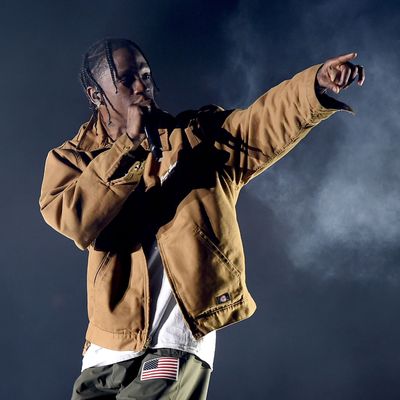
Thanks to top-tier networking skills and strong curatorial instincts that, together, amount to permanent auditioning to be the “it” in the phrase “it’s lit,” Travis Scott has successfully transformed himself into an artist worth hearing out. Fittingly, for a man obsessed by fashion, his best collection is his most recent. Last year’s sophomore effort, Birds in the Trap Sing McKnight, displayed Scott to best advantage by combining agile productions pulsing with dark highlights, in medias res lyrics about drugs and status conveying a sensibility rather than a personality, and a guest list (Kendrick Lamar, the Weeknd, Bryson Tiller, Quavo, 21 Savage, Kid Cudi, Andre 3000) that doubled as a social register of black music’s freshest, best, and/or brightest. What if someone tried very hard to be cool and ended up, finally, becoming kind of cool? That’s the Travis Scott story, and frowning too much at him, as his critics do, for being pointless or in bad faith is pointless in a digitized reality where, like it or not, everyone is occupied by relentless image maintenance: Let they who care not at all about finding their angles and filters cast the first stone, etc.
Judging by his body of work, and by a recent event where the artist dared fans to jump from a three-story height at a concert and was booked on riot-incitement charges, what drives Scott is, basically, a vague injunction to “move people in a certain way.” Yet the hollowness of that phrase (and of Scott’s lyrics) belies an acute sense of taste and a serious work ethic. Being cool is hard, and staying cool is more laborious, and hollow, than ever: “For this life, I cannot change,” Scott repeats on “Butterfly Effect,” which together with “A Man” and “Green & Purple” are the three tracks he released on SoundCloud near midnight on Tuesday.
Like his idol Kanye, Scott has made bringing out the best in other artists into an art of its own; he is acutely aware that producers are artists in their own right. The beats — respectively from Murda, Southside, and Sevn Thomas — are the real draw, and each is superb; the relation of the vocals (delivered by Scott and fellow fashionista Playboy Carti) to them is the same relation as, say, concert venues to the performers playing there. But acoustics matter, and nightlife planning comprises a skill set all its own. Scott, with his polish, dynamism, and nocturnal ambience, has figured out how to operate in clubs and stages better than most. If fame is a role-playing game, he’s maxed out his skill points; just because he isn’t great yet — more character is required to unlock that achievement — doesn’t mean he isn’t already great at what he does.




